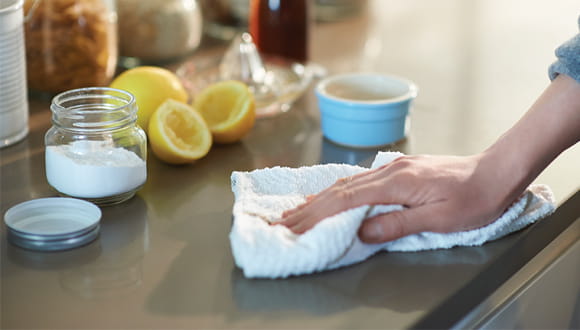Natural Cleaning Products: How They Work & How to Make Them Yourself at Home
Jan. 13, 2022 - Katie McCallumIt's understandable if you approach household cleaning products you find at the store with some caution. It's no stretch to think some might be harmful to your health.
These cleaners often come with long lists of chemicals you can barely pronounce and likely know nothing about but that have been found to be irritating, corrosive, flammable, poisonous if swallowed, able to create harmful fumes. Products labeled as "green" aren't necessarily any safer, either.
It's why you wear gloves, open windows and turn on the exhaust fans while cleaning with them, not to mention take care to store them safely.
It's also why you might be interested in avoiding using conventional household cleaning products altogether and want to learn more about natural cleaners: Can these safer alternatives actually work to keep your home clean?
How do natural cleaning products work?
When it comes to natural cleaning, the primary players are items you likely already have sitting around your home, including:
- Baking soda
- Distilled white vinegar
- Hydrogen peroxide
- Castile soap
- Essential oils
(Okay, you may not actually already have Castile soap at home, but typically it can be found in either the health and beauty or cleaning aisle at the grocery store.)
Here's how these natural cleaners work:
And, mixed correctly, these natural cleaners work, helping to do away with the everyday household dirt and grime you find around your home.
However, while distilled white vinegar and hydrogen peroxide can help kill germs, you may need to pull out the heavier duty cleaners — such as an EPA-registered disinfectant or a diluted bleach solution — if you're cleaning your home while someone is sick with a particularly infectious germ, such as a stomach bug, the flu or COVID-19.
DIY natural cleaning products: How to make them yourself at home
The key to making natural cleaners work is to know how to mix them correctly and use them properly.
Here's a guide to DIY'ing with a few popular types of cleaners to get you started:
When using these natural cleaners, it's still always best to protect your skin and eyes by wearing gloves and avoiding splash-inducing motions or situations.
Additionally, while distilled white vinegar and baking soda may be ingredients you find in your pantry, avoid consuming them in their natural cleaner state. And, of course, never consume Castile soap, essential oils or hydrogen peroxide.
Natural cleaning products you shouldn't mix together
Now that you know how to make your own natural cleaners, here are a few do's, don'ts and never-evers when it comes to other recipes or ideas you might have in mind:
Don't mix hydrogen peroxide and vinegar together in the same mixture. This can create peracetic acid, which may be toxic and can irritate your throat and lungs, eyes and skin. You can, however, alternate spraying hydrogen peroxide and vinegar on a surface. Just make sure to wipe the surface between sprays.
Do skip any recipes that recommend mixing equal parts of vinegar and baking soda. Because vinegar is an acid and baking soda is a base, mixing the two essentially balances out to create water (and a small amount of sodium acetate). You can add small amounts of baking soda to vinegar to help reap the benefits of baking soda's abrasive nature or take advantage of the resulting foaming reaction, but adding too much dilutes the cleaning power of both.
Never mix vinegar or rubbing alcohol with bleach. We haven't mentioned rubbing alcohol yet and bleach isn't a natural cleaner, but it's worth stressing that bleach should never be mixed with either of these common items you find in your home. Mixing vinegar with bleach creates chlorine gas and mixing rubbing alcohol with bleach creates chloroform.
So ... does all of this mean that manufactured cleaners are unsafe to use?
If you still prefer to use household cleaners from the store, the good news is that the U.S. Environmental Protection Agency (EPA) requires manufacturers disclose whether a cleaning product contains chemicals of known concern. Cleaners containing these hazardous ingredients must warn consumers of this potential risk on the label, outlining the precautionary steps needed for safe handling and first-aid instructions if the product is used in an unsafe way.
The not-so-great news, though, is that there are a lot of chemicals out there being used in cleaning products, not all of which have been extensively studied and some of which could potentially be harmful.
But it's not all bad news for household cleaners made by manufacturers.
The EPA Safer Choice Label initiative can help you find safer cleaners. Certified products containing the label meet the EPA's "Safer Choice Standard" — meaning their ingredients pass stringent safety criteria. For products that don't fall on this list, you can do your own research, buy one that's upfront about its exact chemical ingredients.
Still, even if you do make safer choices with household cleaners, the way you use them can make them unsafe.
Two tips to sidestep such risks: Never mix a cleaner that contains bleach with one that contains ammonia, as this creates chloramine, a toxic gas. And always check the label of cleaners to determine whether they contain ammonia or bleach and make a point to keep these cleaners separate.








